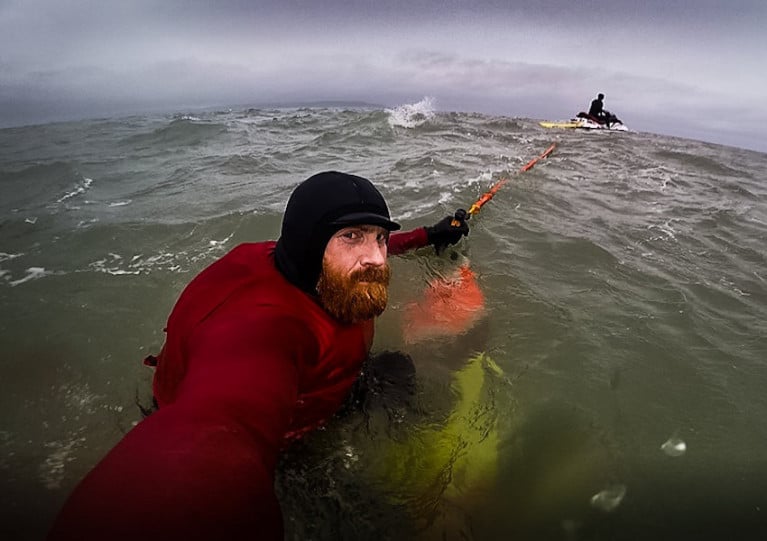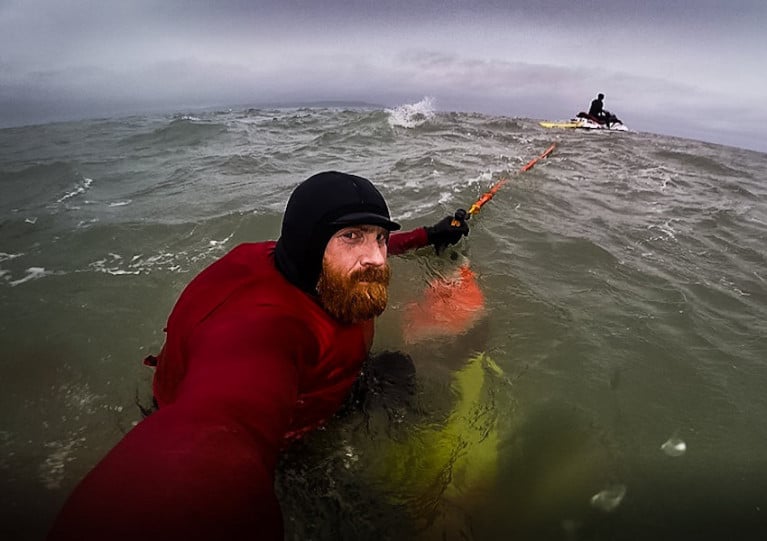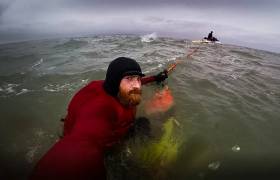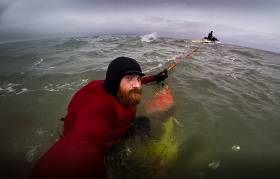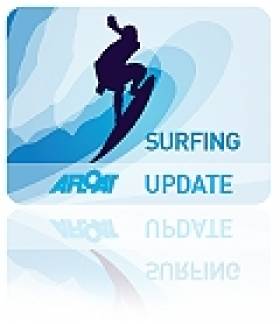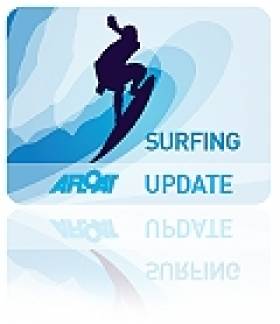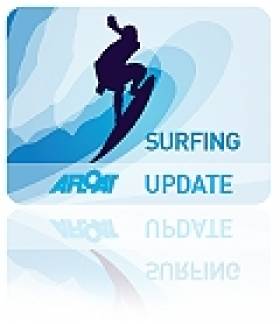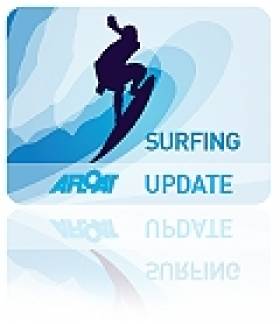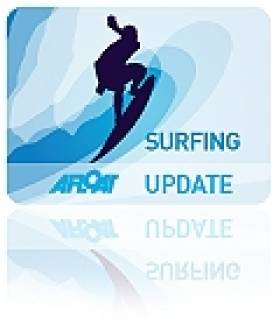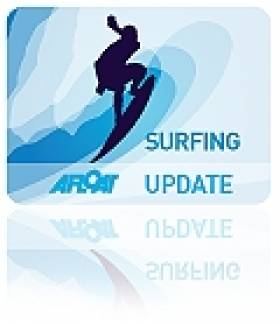Displaying items by tag: Al Mennie
NI Surf Pro Al Mennie Battles Blaze on North Coast Beach
Northern Ireland surfing pro Al Mennie was among the volunteers who joined fire fighters battling a gorse blaze on Castlerock Beach in Co Derry last night (Tuesday 30 March).
As the Belfast Telegraph reports, 40-year-old Mennie was out catching the waves minutes from his home when he noticed the fire break out around 8pm.
The surfer then teamed up with a group of teenagers to attempt to dampen the flames with sand before the arrival of the Northern Ireland Fire and Rescue Service.
The Belfast Telegraph has more on the story HERE.
Lovers Of Watersports From NI Share Their Tips For Better Mental Health
Northern Ireland surfer Al Mennie says conquering some of the world’s biggest waves has helped in managing his mental health.
In the run-up to World Mental Health Day yesterday, Saturday 10 October, Mennie told UTV News how his preparation for taking on the giant swells at Nazaré and other big wave spots as given him “a really good understanding of anxiety and fear”.
And he’s also benefitted from putting his thoughts and concerns into writing, even publishing a book about his experiences.
“So, for men who don’t want to talk, I think this is a good piece of advice — if you can write stuff down and get it out of your system, it’s a great way of dealing with whatever you’re going through.
“And that might actually open the door to you then going and speaking to somebody.”
Getting into the great outdoors has also been beneficial to Lydia Millar, a final-year law student at Queen’s University Belfast who joined her university’s sailing club in her second year to help in improving her wellbeing.
“Escaping the city and being thrown into a boat with likeminded people did, and continues to do, so much for my mental health,” she tells RYANI, adding that it not only gave her a new sense of community but also directed her focus “from inward to outward”.
This year’s World Mental Health Day also saw the launch of a live training package for seafarers whose wellbeing may be affected by the challenges of the coronavirus pandemic, as previously reported on Afloat.ie.
Big wave surfer Al Mennie talks to the Belfast Telegraph about how he keeps fit and healthy between his challenging surfing experiences.
In a candid Q&A, the Portrush surfer — who features in BBC Two NI show Tide this Sunday 16 June at 9.45pm — reveals the extent of the punishment he’s put his body through to ride the biggest swells.
“[From] surfing I have had broken ribs, have split my head open several times and have been concussed. I often think I’ve been very lucky.”
The “extreme” of this sportsman’s chosen field even extends to his diet — or rather, two diets.
“I eat very well and see myself as an athlete and need to fuel my body, but you will see me in a well-known fast food chain the odd time,” he says.
Perhaps understandably for someone who undertakes such a high-stakes endeavour, Mennie confesses he is “full on all the time”.
“Because I am a surfer, people think I must be chilled out — I am actually really far from being chilled out. At night I'm writing books or working on some sort of plan.”
Mennie’s book Overcome or Succumb was published last year, as previously reported on Afloat.ie. And the Belfast Telegraph has more on his story HERE.
In other surfing news, Dublin Gaelic football forward Ciaran Kilkenny tells the Irish Examiner how riding the waves had become a part of his fitness regimen.
“I generally try to go the day after a game, because you get a bit of a recovery in, too,” he says.
“Even for the head, it’s great to go to a place like Bundoran, or Strandhill or Lahinch, the sea breeze, it’s great to go down and get in the water and up on the board.”
The Irish Examiner has more on the story HERE.
Big Wave Surfer Al Mennie Uses His Experiences in Life Threatening Seas to Show How He Manages Anxiety & Fear in All walks of Life
You Will Turn the Tide! That is the message from Northern Ireland's Big Wave Surfer Al Mennie in his new book 'Overcome or Succumb'.
Al Mennie is best known for tackling gigantic waves in the wildest of weather and in doing so facing all sorts of anxieties and fears head on.
Anxiety and Fear effect millions of people to varying degrees across the world and appear to be a growing issue despite lots of research and resources available in how to handle them. Al believes his experience surfing some of the biggest waves on the planet has lead him to understand anxiety, fear and panic and allowed him to handle lots of everyday situations with a similar approach.
“I personally experience fears and anxieties like everyone else. What I learned skills over the past 28 years of putting myself in gradually bigger and bigger seas in the pursuit of gigantic waves has led me to understand myself, how fear and anxiety affect me and how to continue forward regardless”
“I don’t believe I have the ultimate answer, I don’t believe anyone does for that matter and the reason for that is that everyone, every situation, everything is different. I don't see Fear and Anxiety as text book issues that can be dealt with in the same way by everyone. I see Fear and Anxiety as personal feelings, not universal. I believe that there are some specific principles which can help, and I believe that once something is faced that it becomes easier to face the next thing and so on. Life can become better because facing fears leads to experiences and opportunities”
"I hope something from my experience is of help to someone else"
In the book Overcome or Succumb, Al tells of various situations of how he felt anxiety for days before and fear in the moment whilst facing 100-foot waves, a burglar and even the dentist chair after avoiding it for 11 years! He tells how he has learned to handle those feelings, accept them and carry on.
The book Overcome or Succumb is available here
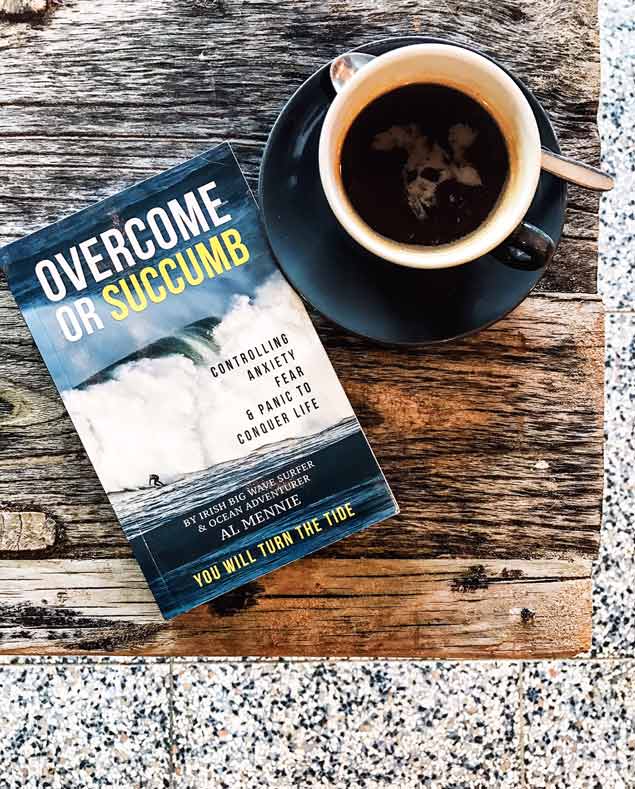
What is in the book Overcome or Succumb?
All sorts of things from stories of Anxiety, Fear and Panic I felt in the lead up to and during some of the biggest surf ever ridden and how it was handled and managed. I give real accounts of how I felt and how it has taught me to handle other fears and anxieties in my life including the dentist! I avoided him for 11 years until I was able to handle the fear and anxiety I associated with him since I was a teenager!
The book illustrates how learning to handle fear and anxiety can improve happiness and provide lots of opportunities in life.
Is the book Overcome or Succumb just for surfers?
No! Absolutely not! This is not a "surf book" full of cowabunga gnarly dudes! Far from it!
I learned how to handle Anxiety and Fear through my pursuit of big waves all over the world, but this book explains lots of scenarios where those skills have transferred to ordinary life. This is a book for anyone who wants to read about anxiety and fear in extreme situations and how the skills I have for managing them are applicable to my everyday life.
This book is for anyone who wants to see how I have managed anxiety and fear in extreme situations and used it to better my life by tackling life in the same way, using the same techniques learned in huge seas.
Is Al a Doctor or Medical Professional?
NO, I AM NOT! This is not a book of research or a book written by an onlooker or Scientist! This is a book full of my own experiences with anxiety and fear, it's personal to me. I have learnt a specific skill in handling anxiety and fear and I have been able to adapt and apply it to everyday life. I am fortunate to be in a position to write it down and share it for others to read. If anyone reading this or the book seeks medical expertise, then they should seek a suitably qualified practitioner. This is a book of my experience with some of the most debilitating feelings and emotions known to human beings and how I have been lucky enough to learn how to handle them. It is not a book of medical or scientific advice. I cannot advise an individual on anything in life as everyone’s situation is different, we all have different skills, different hurdles and it would be naive to think anyone, including me, has the ultimate answer. I share my experiences in the hope that others may find a way in themselves to also face their fears and handle their anxieties based on the knowledge that others have made it to the surface.
Are you actually scared of the Dentist? Like seriously?
Yes, I am! I had a traumatic experience as a teenager which unknowingly lead to extreme fear and anxiety. I didn't go back for 11 years and I had the most horrific experience when I did! It's ok now though, I got over it!
What's it like to be sitting on a surfboard way out at sea trying to catch a big wave?
It's very intimidating. I'm a big guy at 6'5" and the vastness of the ocean and the volume of water moving forming giant waves makes me feel small and insignificant. Putting myself in the position I need to be in order to catch one of these huge, dark, menacing walls of water as it's coming for me is a major psychological battle. My mind is terrified, but my heart is telling me to go for it. It's a battle of the heart and mind in a very dangerous environment. I've spent many years doing this not just in Ireland, but all over the world so I have had a lot of exposure to fear and anxiety beforehand when I'm worried about what the storm will bring, worried about my team, what happens to my family if something happens to me?
There are so many things that go through my mind and heart before I even attempt to ride a big wave that involve anxiety and or fear. Hence why I have become proficient at recognising fear and anxiety in everyday life and become good at handling it in various ways.
Do you get anxious and scared?
Yes, I do! Everyone does! It's happened to me so many times in the pursuit of riding huge waves that I've learned how to deal with it. If I didn't learn how to deal with it I wouldn't be able to surf all the giant waves I've wanted to, and I would have to accept something much less than what I wanted for myself.
I am not void of fear and anxiety, far from it, it is bubbling inside me a lot, but I am aware of it and I do not let it stop me going after what I want, well most of the time!
Why did you write this book?
I wrote this book for a few reasons. One of which being that surfing is a relatively selfish pursuit. It doesn’t really do anything to help anyone but the surfer. I know I have lots of knowledge and experience honed from in particular big seas which let’s be honest, isn't of any use to anyone but me. I have always wondered how I could use that knowledge to help others in some way. A few years ago, after a girl drowned at a local beach, I attempted to launch a campaign called "Ask a Surfer" at the time to try and raise awareness of beach and water hazards for tourists to try and prevent fatalities. Despite help from MP's I struggled to get it rolling. Since then I realised that passing on knowledge about things I have dealt with in my own life may be one way I can help. I also hope in the future to be able to work with children and adults that have lost a parent as I believe the impact caused by that is immense and I know what it is like to go through and I would like to in some way help those going through that. However, I haven’t worked that one out yet, but someday I will. For now, its fear!
Surf Record Breaker Garrett McNamara Rides '100ft Wave'
#Surfing - Garrett McNamara has done it again - after riding what is claimed to be the largest wave ever surfed.
Last summer on Afloat.ie we reported that the Irish-American surfing pro had his previous world record attempt - a 78-foot monster off Portugal in November 2011 - confirmed by Guinness record-keepers.
But the Hawaiian wasn't content to rest on his laurels, and on a recent return visit to Nazaré he is said to have smashed his own record with a wave reported to be as much as 100ft in height.
The Guardian has video of McNamara's incredible attempt which you can view below - it's a sight that beggars belief!
McNamara's previous tow-in surf at Nazaré earned him the Biggest Wave title at the 2012 Billabong XXL Big Wave Awards. He shared his $15,000 prize money with Devon surfer Andrew 'Cotty' Cotton, who towed him by personal watercraft into the massive swell.
"Everything was perfect, the weather, the waves," said Northern Irish surfer Al Mennie, who was on hand to witness the pair at Praia do Norte.
Surfer Al Mennie Rides a 50ft Wave - As seen By a Go Pro Camera
#surfing – Surf regular on Afloat's homepage Al Mennie from Coleraine is back on the water again. Although from the angle we're watching this 50-foot waves does not look that impressive it's very clear from Mennie's reaction just how big this spot in Portugal actually was.
Up Close and Personal with NI Big Wave Surfer Al Mennie
#SURFING - Top press photographer Charles McQuillan recently travelled to Northern Ireland to capture big wave surfing pro Al Mennie in training for the winter season, as The Irish Times reports.
McQuillan set out to document every aspect of Mennie's surfing life on the north Antrim coast, from the pre-dawn starts and protein-heavy breakfasts to the gruelling solo training sessions and the thrill of the surf itself.
And he made sure to get up close and personal with his subject, using waterproofing equipment to photograph him underwater - and even following him on a jet-ski to the secret offshore surfing spots known only to Mennie and his fellow big wavers.
The snapper described the surfer as "incredibly at home" in the water. Not surprising for a man used to taking on the enormous Finn McCool swells off the Giant's Causeway, or paddling across the North Channel for charity as he did this past spring (see more pics of Mennie surfing HERE).
As Mennie tells the Belfast Telegraph, he has the good fortune to be able to ride “the biggest, scariest waves on the planet” in his own backyard.
It comes at a price - Mennie must be in peak physical condition at all times, as one never knows when the big one might come - but it's a price he's more than willing to pay, with his body and his mind.
“Big-wave surfing is at least 80 per cent to do with your mind, and the physical aspect boosts the mental side," he tells The Irish Times. "I don’t feel 100 per cent in myself unless I’m training properly.”
Meanwhile, The Irish Times also highlights the best places to get your wetsuit on and go surfing in Ireland during the increasingly popular winter season, with schools in the hotspots of Lahinch in Co Clare - the focus of a new book by journalist Keith Duggan - and Bundoran, Co Donegal upgrading to meet the demand.
And even if its waves aren't up to scratch, the east coast still is getting some of the action, with stand-up paddleboarding (SUP) becoming the latest way to ease into the sport.
Surf Pro Paddles from Giant's Causeway to Scotland for Charity
Northern Irish surf pro Al Mennie took on a different challenge this month, when he paddled a surfboard from the Giant's Causeway to Scotland in the name of charity.
"It will be the northernmost crossing of its type in the world," said Mennie of the 25-mile route from Antrim to the Scottish island of Islay.
It had been two months of solid training and preparation. Al Mennie and crew after a restless night set off from the Giants Causeway on the Antrim coast, its beauty hidden by darknes.
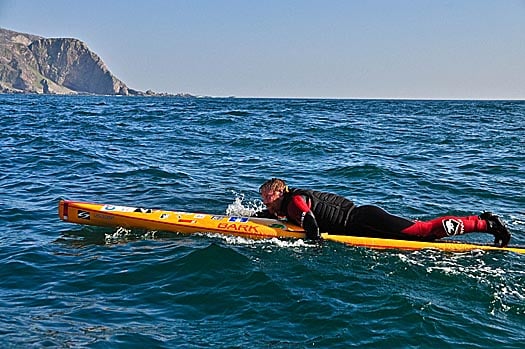
Al approaches Islay. Photo: Conn Osborne
A well paced start of three hours and calmer conditions gave way to a challenge of a stiff side wind and buffeting seas, this would prove demanding and speed sapping. More challenges awaited as the Middle Bank lay in wait.. a swirling lump of water that draws everthing into and around it.
Al found this challanging as the effort out weighed the results as time, speed and distance updates were called out to him, foresight, the support of friends (the crew) and sheer determination and willingness to succeed would prove that this Giant paddle to be completed in far from ideal conditions in Nine Hours and twenty-five minutes.
After completing the challange for Charity.. Heart, Chest and Stroke, (donations can be made via his website.. Al Mennie.com) Al rests happily at home, all be it a little tired.
Top Surfers Tackle Biggest Rollers in Years Off Mullaghmore
#SURFING - It may have been too late for the postponed Tow-In Surf Session, but the big waves at Mullaghmore Head finally picked up this week - and some of the world's top surfers were there to take advantage of the swell.
As The Irish Times reports, an extreme weather system nicknamed the 'Viking storm' helped produced monster rollers on Thursday that are the biggest the area has seen in 15 years.
Devon surfer Andrew 'Cotty' Cotton rode the biggest wave when he tackled a 50ft giant, assisted by his Irish tow-in partner Al Mennie, while Brit boarder Tom Butler recorded the biggest barrel.
Richie Fitzgerald described the scene as "very calculated madness", noting that a safety crew was on hand as the 16-strong group took on the "huge, unruly and very dangerous swell".
The Irish Times has much more on the story, while Surfer Today has more video of the last winter swell at Mullaghmore Head HERE.
Al Mennie's Epic Charity Paddle from Giant's Causeway
#SURFING - Northern Irish surf pro Al Mennie will be taking on a different challenge later this month, when he sets out to paddle a surfboard from the Giant's Causeway to Scotland in the name of charity.
"It will be the northernmost crossing of its type in the world," says Mennie of the 25-mile route from Antrim to the Scottish island of Islay.
"I will have to deal with freezing cold temperatures, large open ocean swell, potentially high winds and the deadly currents around a well known navigational hazard of a North Atlantic island."
Mennie will be on his own except for a support boat carrying food and water. He will be wearing a 6mm wetsuit and crossing the most dangerous stretch of water around the Irish coastline, "known for its extremely deadly currents as the Irish Sea tides drain between Rathlin Island and Northern Ireland".
The NI surfer is embarking on the challenge in aid of Northern Ireland Chest Heart and Stroke, which is a charity close to his own heart.
"My dad died suddenly of a heart attack aged 50 and I know lots of people who have also lost loved ones to heart problems too," he says, "so I really want to help make a difference by raising money for this charity."
For more details or to make a donation, visit the charity page at Al Mennie's website HERE.



























